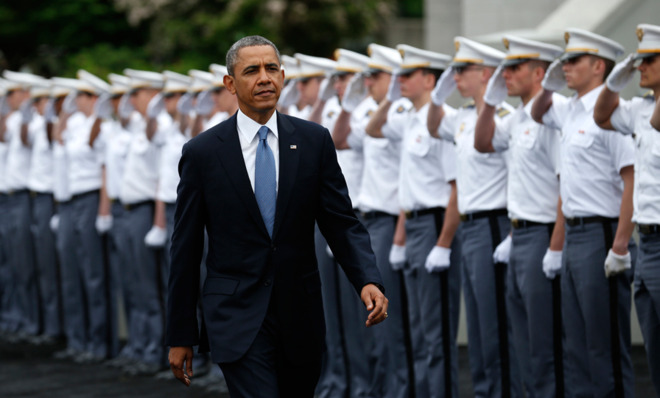Obama's fool's gold foreign policy
And how the GOP can do better


Employing his usual King Solomon impression, President Obama gave a major foreign policy speech at West Point earlier this week, just days after more or less announcing the end of the war in Afghanistan. The president rather predictably dismissed trade-offs and cost-benefit analysis as "false choices." He positioned himself as the sane center between the extremes of isolationism and hyper-interventionism, the old band Stealers Wheel as commander-in-chief: "Clowns to the left of me/Jokers to the right."
The reactions, with a few exceptions, were largely negative. Colin Dueck of George Mason University, for example, dismissed both the address and the president's approach to foreign policy as "lukewarm porridge for breakfast." He listed several incidents where Obama made grave-sounding threats to bad actors on the world stage and then failed to follow through, one derailed red line after another.
Yet whatever Obama's score is against Vladimir Putin and Co., he keeps beating Republicans on foreign policy. That's because, aside from the surge in Afghanistan, he has generally given the American people what they wanted.
The Week
Escape your echo chamber. Get the facts behind the news, plus analysis from multiple perspectives.

Sign up for The Week's Free Newsletters
From our morning news briefing to a weekly Good News Newsletter, get the best of The Week delivered directly to your inbox.
From our morning news briefing to a weekly Good News Newsletter, get the best of The Week delivered directly to your inbox.
Most Americans want to be kept safe from terrorism and aggression without massive military interventions that go on longer than World War II with no victory or end in sight. So Obama pulled out of Iraq — he wouldn't be president today if he hadn't opposed that war — and will soon do the same thing in Afghanistan.
Instead of large-scale wars with boots on the ground, Obama has preferred to strike from the air whenever possible. No ground troops in Libya. Drone strikes to kill terrorists. Negotiations with Iran rather than threats of military force. Only risk Seal Team 6 for big missions, like taking out Osama bin Laden.
When Obama contemplated a war to enforce his chemical weapons "red line" in Syria, it soon became apparent there was no support for the idea among voters or Congress. So he quietly dropped the plan.
Republicans fail to lay a glove on Obama's foreign policy because they keep insisting he do what the American people don't want. Don't leave Afghanistan, John McCain, Lindsey Graham, and Kelly Ayotte say. Stay longer in Iraq, two-thirds of the GOP's Three Amigos demand. Be careful about an unauthorized incursion into Pakistan to get bin Laden, but please get more involved in Ukraine. While you're at it, authorize military force in Iran.
A free daily email with the biggest news stories of the day – and the best features from TheWeek.com
Most Republicans declined to go along with Obama's plans in Libya or Syria, in alignment with public sentiment. But some of the loudest GOP voices wanted to intervene more heavily in Libya and do more, sooner in Syria.
With the exception of Pakistan, Republicans have usually criticized Obama for doing too little, not too much. He's weak, they say. He leads from behind. He shirks his world leadership duties.
In truth, he has been too interventionist. Yes, the president's speechifying without action is problematic, his inattention to competition from Moscow and Beijing baffling. But most of the empty threats the president has issued should never have been made. Most of his red lines should have gone undrawn.
In Afghanistan, America began a just and necessary war in response to the 9/11 terror attacks. America's effort there was first starved of necessary attention due to George W. Bush's misguided crusade in Iraq, and then morphed into an ineffectual nation-building exercise. Obama deserves part of the blame for the latter. More than 70 percent of the U.S. military deaths in Afghanistan have occurred during his presidency.
And in Libya, the administration's mendacious Benghazi spin immediately following the consulate attacks is hardly the biggest example of its failure. That country is now awash in terrorists filling a power vacuum created by an ill-conceived "kinetic military action." But Republicans focus almost exclusively on Benghazi.
Obama's basic policy of targeted terrorist killings is sound, but the drone strikes have resulted in too much collateral damage. The civilian deaths are not just morally problematic. They increase anti-American sentiment, which in turn helps terrorists win support.
Few Republicans are willing to make this critique of Obama's foreign policy. But shouldn't conservatives be the first to demand accountability and results when the government spends blood and treasure? Imagine if we were talking about a domestic program like the VA or ObamaCare.
Many Democrats recognize their vulnerability to anti-interventionist criticisms, especially as the party prepares to nominate someone who voted for the Iraq war for president. Perhaps Obama recognizes this too. The Washington Post's Chris Cillizza argued the president's speech sounded like an attempted takedown of Rand Paul.
W. James Antle III is the politics editor of the Washington Examiner, the former editor of The American Conservative, and author of Devouring Freedom: Can Big Government Ever Be Stopped?.
-
 Political cartoons for January 25
Political cartoons for January 25Cartoons Sunday's political cartoons include a hot economy, A.I. wisdom, and more
-
 Le Pen back in the dock: the trial that’s shaking France
Le Pen back in the dock: the trial that’s shaking FranceIn the Spotlight Appealing her four-year conviction for embezzlement, the Rassemblement National leader faces an uncertain political future, whatever the result
-
 The doctors’ strikes
The doctors’ strikesThe Explainer Resident doctors working for NHS England are currently voting on whether to go out on strike again this year
-
 The billionaires’ wealth tax: a catastrophe for California?
The billionaires’ wealth tax: a catastrophe for California?Talking Point Peter Thiel and Larry Page preparing to change state residency
-
 Bari Weiss’ ‘60 Minutes’ scandal is about more than one report
Bari Weiss’ ‘60 Minutes’ scandal is about more than one reportIN THE SPOTLIGHT By blocking an approved segment on a controversial prison holding US deportees in El Salvador, the editor-in-chief of CBS News has become the main story
-
 Has Zohran Mamdani shown the Democrats how to win again?
Has Zohran Mamdani shown the Democrats how to win again?Today’s Big Question New York City mayoral election touted as victory for left-wing populists but moderate centrist wins elsewhere present more complex path for Democratic Party
-
 Millions turn out for anti-Trump ‘No Kings’ rallies
Millions turn out for anti-Trump ‘No Kings’ ralliesSpeed Read An estimated 7 million people participated, 2 million more than at the first ‘No Kings’ protest in June
-
 Ghislaine Maxwell: angling for a Trump pardon
Ghislaine Maxwell: angling for a Trump pardonTalking Point Convicted sex trafficker's testimony could shed new light on president's links to Jeffrey Epstein
-
 The last words and final moments of 40 presidents
The last words and final moments of 40 presidentsThe Explainer Some are eloquent quotes worthy of the holders of the highest office in the nation, and others... aren't
-
 The JFK files: the truth at last?
The JFK files: the truth at last?In The Spotlight More than 64,000 previously classified documents relating the 1963 assassination of John F. Kennedy have been released by the Trump administration
-
 'Seriously, not literally': how should the world take Donald Trump?
'Seriously, not literally': how should the world take Donald Trump?Today's big question White House rhetoric and reality look likely to become increasingly blurred
